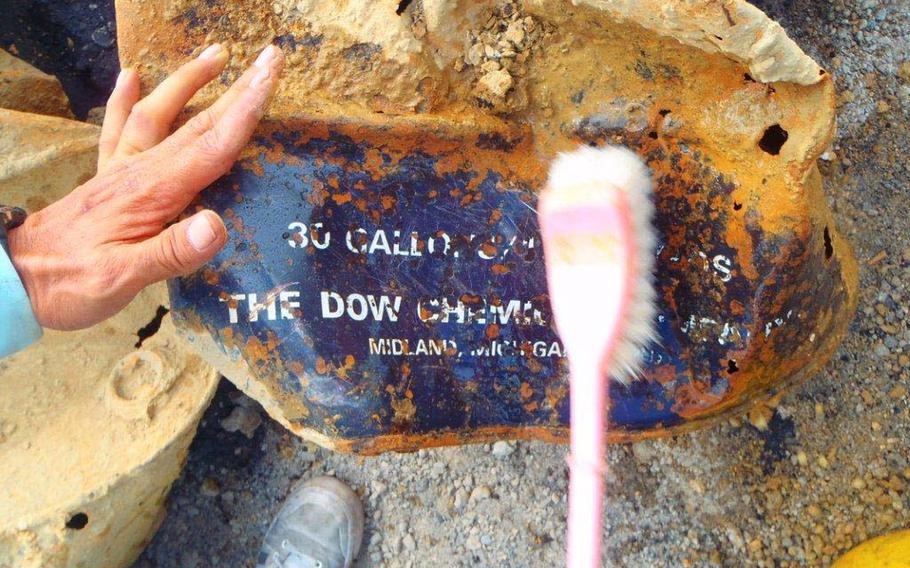Asia-Pacific
Barrels found on Okinawa did not contain Agent Orange, Dow Chemical says
Stars and Stripes June 28, 2013

A Japanese worker brushes away dirt from one of 16 barrels unearthed in Okinawa City on June 13, 2013. The city called for Tokyo to investigate for Agent Orange, but manufacturer Dow Chemical Company denied the drums contained the herbicide. (Photo courtesy of Okinawa City)
CAMP FOSTER, Okinawa — Dow Chemical Co. said Friday that, despite local fears, barrels unearthed from former U.S. Air Force land on Okinawa did not contain Agent Orange herbicide.
The Okinawa City government demanded this week that Tokyo investigate whether 16 rusty, empty Dow drums found under a soccer field near Kadena Air Base could have held dioxin-laden defoliants used by the United States during the Vietnam War.
The U.S. has long denied the herbicides were ever used or stored on Okinawa, but military pollution has remained an issue for an island weary of supporting a large number of bases. In a separate incident this month, the Japan Ministry of Defense said it is again looking into the presence of petroleum, benzene and lead in the soil of another former U.S. military site on Okinawa.
Public concern over Vietnam-era herbicides has spiked recently thanks to a series of articles by the Japan Times newspaper, which challenged the U.S. denial of Agent Orange on Okinawa and quoted some American veterans who claimed to have used and come into contact with the defoliants during deployments here decades ago.
Dioxin herbicide has never been unearthed or discovered on Okinawa. Earlier this year, the Department of Defense said it investigated and found no basis for the claims in the newspaper.
The military used herbicides to kill jungle cover and enemy crops in Vietnam. Dubbed Agent Orange for the color-coded storage drums, the herbicides were later linked to cancer, diabetes, severe acne and birth defects.
“The type and markings of the barrels depicted in photographs published recently by the Japanese media are different from the barrels that were used to ship Agent Orange,” Dow spokeswoman Linda Lim wrote in an email Friday. Stars and Stripes obtained photographs of the containers and markings from Okinawa City.
The contents of the partially crushed and decomposing blue barrels found under the soccer field remain unknown. It is also uncertain that the U.S. military left them there.
“Due to the many decades that have passed and the absence of more information about the drums, Dow cannot speculate on the original content of the drums, if any,” Lim wrote.
A spokesperson for Okinawa City said the drums may have been buried empty.
The Air Force says the soccer field land was once part of Kadena but was returned to local control in 1987.
The service is now assisting with the Japanese investigation into the origin of the Dow drums, Kadena spokeswoman 2nd Lt. Hope Cronin said.
Meanwhile, the Ministry of Defense investigation into new pollution on former Marine Corps land in south-central Okinawa is ongoing.
The ministry’s Okinawa bureau told Stars and Stripes it recently found traces of petroleum at various sites during a soil survey on land adjacent to Camp Lester that was returned to Japan in 2003.
It is now testing to determine whether there is widespread contamination with petroleum, lead and benzene, common pollutants linked to cancer and neurological impairments.
The land has a history of pollution. Substances such as hexavalent chromium, arsenic, lead and petroleum have been found seven times since the area was returned to the Japanese, according to the defense bureau.
“An investigation following the discovery of soil with the odor of petroleum found that the contaminated area could possibly be much wider,” a bureau spokesman said.
The land is bordered by military family housing and a Department of Defense school on the Camp Lester Marine Corps base.
The Marine Corps said it had not reviewed the Japanese environmental findings but that no such contamination has been found on Camp Lester and the base faces no health risks.